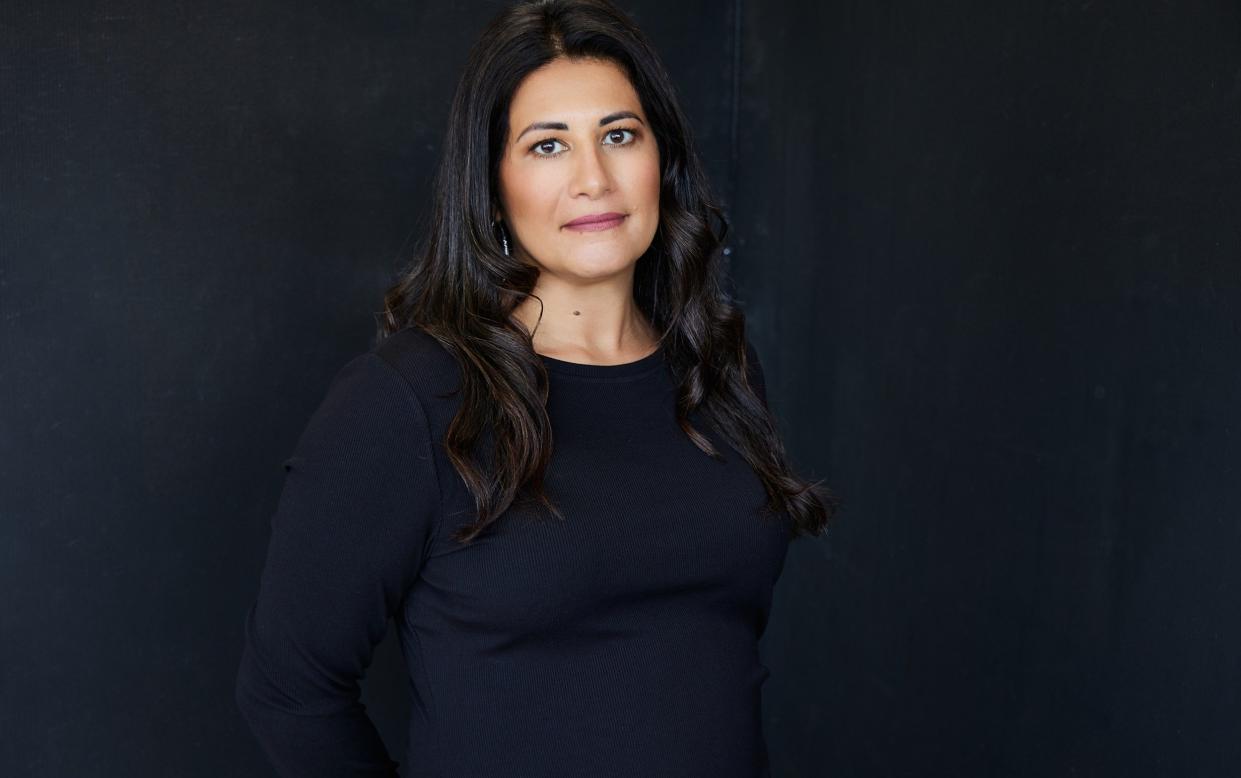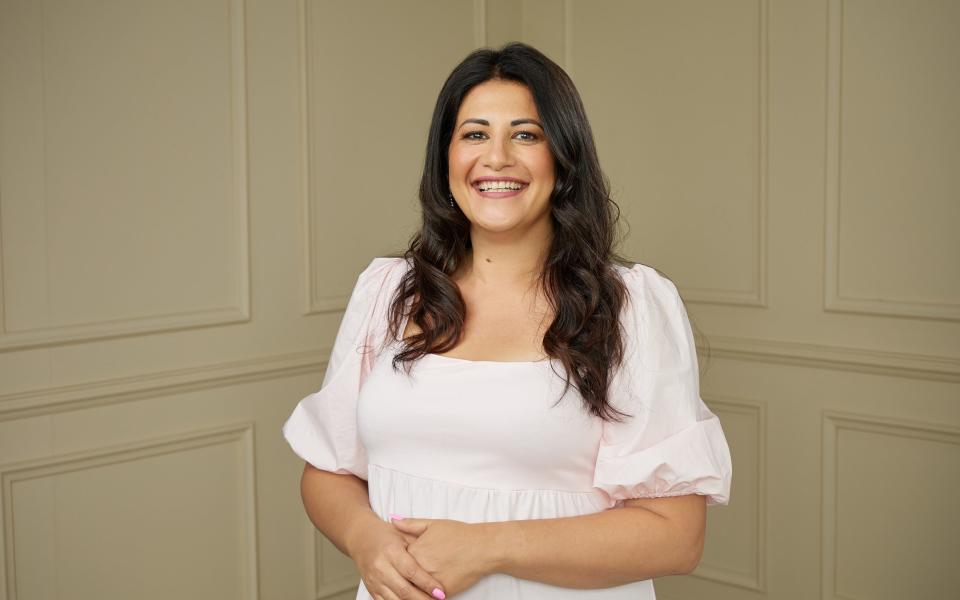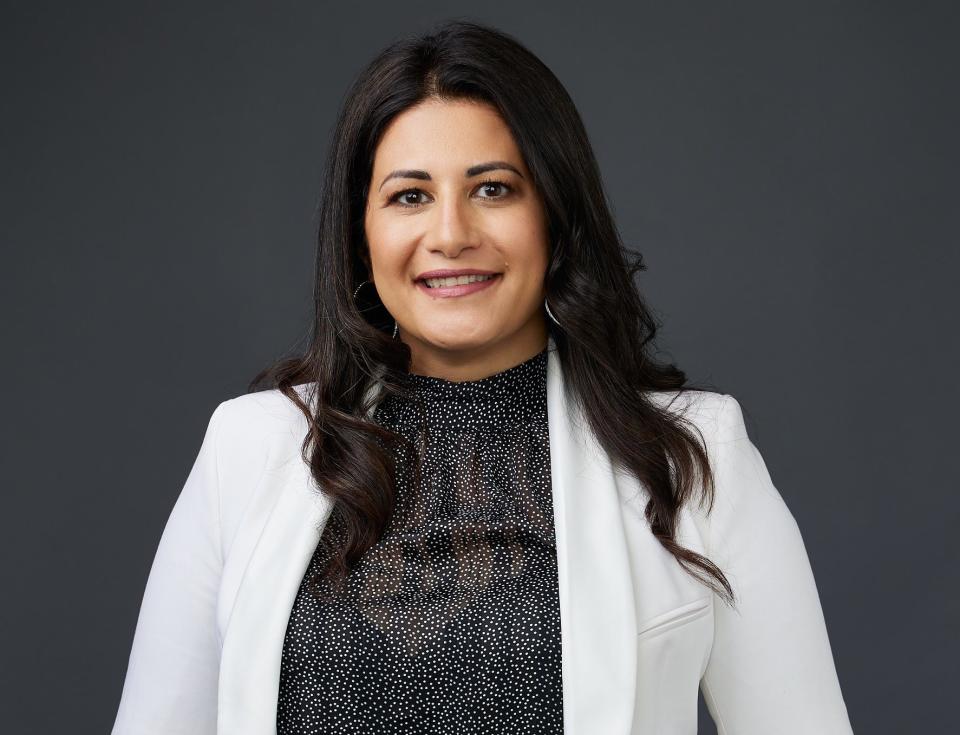Yasmine Mohammed interview: ‘What horrified my father the most was when people equated Palestine with Hamas’

- Oops!Something went wrong.Please try again later.
- Oops!Something went wrong.Please try again later.
Yasmine Mohammed – not her real name – first caught my eye on X, formerly known as Twitter, in the days following the Hamas onslaught in Israel on October 7.
It wasn’t just her exceptionally bold stance against Hamas, the anti-Semitism within the pro-Palestine movement and extreme Islam, with tweets such as: “Islamism is a failed ideology”, it was that while social media has seen an increasing number of Muslims – including ex-Hamas member and Israeli spy Mosab Hassan Yousef – bravely speaking out to defend Israel and condemn Hamas, it is extremely rare to encounter a Palestinian who is willing to go public with such views.
Mohammed is the author of the 2019 book Unveiled: How Western Liberals Empower Radical Islam and the founder of Free Hearts, Free Minds, a charity that supports Muslims who want to leave their religious communities.
Born and brought up in Vancouver with a father from Gaza and an Egyptian mother, Mohammed entered a forced marriage at 19 to an al-Qaeda operative. Today she is based in an undisclosed location in Europe, where she and her second husband (“salt of the earth Newfoundland stock”) are spending the year after facing unspeakable threats at home.
When I speak to Mohammed over Zoom, she tells me how hatred of Hamas among Gazans has long been widespread. “My father always hated Hamas. His biggest problem, the thing that horrified him the most, was when people equated Palestine with Hamas. Who wants the face of a terrorist organisation to be the face of their homeland? No good person.”

But the West doesn’t grasp this, says Mohammed, and Canada is among the worst offenders. “In Canada we have had countless anti-Semitic attacks, as in schools being attacked by gunfire. And Canada was one of the first countries to host pro-Hamas rallies. Every day our prime minister is tweeting ‘anti-Semitism is horrible, we need to stand up against that’. But they’re not doing anything about it. They hired an Islamophobia minister. It’s staggering as the hate crimes against Jewish people are six times more than anything happening to anybody from a Muslim background.”
Encouraging radicals
Meanwhile, she says, the West has been broadly encouraging radical Islam, a subject she addressed in Unveiled. “The biggest problem is that we [in the West] have been trained to never criticise any religions or groups other than our own,” she says. “Western societies are allowed to point to the problems with feminism, liberalism or free speech. But any criticism of Islamic cultures is deemed xenophobic or racist.” This reluctance to apply to Islam the same pressures for change and improvement we apply to ourselves is a form of the inverse racism of low expectations, she says.
Something which she feels is evident in the failure of many Westerners to properly condemn Hamas’ actions on October 7. Instead of heaping continued condemnation on Hamas, as we would do with any other group, she feels that many Western establishments – universities, the media, politicians – imply its behaviour is a fitting response to Palestinian grievances.
To illustrate, she uses a characteristically startling example: “After the Holocaust, would you now expect Jewish people to jump into the homes of German people and start slaughtering families and kidnapping people? Of course not.”
But, when it comes to Arabs or Muslims, Mohammed believes, a different, lower set of expectations is applied – as if barbarism is perfectly OK.
Mohammed, who is in her late 40s, wearing a silk polka-dotted blouse, is striking and impeccably groomed. None of what has unfolded on or after October 7 has surprised her, as for years she has been accused of alarmism following her comments on social media and in her book, about the problems arising from fundamentalist Islam and its indulgence in the West.
Professional support
Yet her whistleblowing is how in 2017 she ended up founding Free Hearts, Free Minds after she was “getting bombarded by people sharing their stories, and sharing their traumas,” she says.
“It was excruciating. And so I realised that I needed to be the middleman and start an organisation where there were professionals supporting these people.”
While the charity is unable to arrange the practicalities of escape, it provides a first point of contact, plus encrypted online resources, including mental health support, and networking with like-minded people who can assist with getting out. The bulk of the people who reach out to her come from Saudi Arabia and Egypt, she says.
I ask about how she ended up marrying senior al-Qaeda operative Essam Marzouk, an Egyptian who came to Canada on a fake Saudi passport after spending time in Pakistan and Afghanistan.
“I was looking for my mum’s approval. As much as she was very narcissistic, abusive, and toxic, this desire to be the good daughter was really what pushed me. She found this man who she said was the most perfect example of a Muslim and felt I needed to marry him. And if I didn’t, she said she would kick me out of the house. I would no longer be her daughter. I wasn’t even to come to her funeral. And so I had no choice.”
Mohammed’s options for escape had further narrowed after two years in Egypt – where her mother had taken her to strengthen her credentials as a good Muslim. “I didn’t have any connection with any of my friends because all of that had been severed while I was in Egypt. This is pre-social media days, so if you’re not writing physical letters to your friends, you’ve lost touch. I had no support system. I didn’t know where to go and I didn’t know what to do.

“Once the marriage was agreed I was put in a niqab. Head to toe in black. A face cover was delivered from Saudi Arabia. The gloves. The socks.”
Mohammed was shocked by how her new husband treated her. One week into the marriage, he caught her at home, on the 17th floor, without her coverings on.
“He comes home, the curtains are open and I’m not wearing hijab because I’m in the house. He starts freaking out because everybody can see me from the windows. And I responded with, ‘Who’s everybody? People in helicopters?’ That was the first time he beat me up. I’ve been beaten up my whole life,” she says, telling me that after her mother remarried she was regularly beaten by her, for instance if she failed to recite parts of the Koran accurately. “So it wasn’t a surprise. It was disappointment. But I had never been beaten up like this before.
“When I told my mother what happened she said: ‘Don’t you know it’s in the Hadith, Chapter four, verse 34. Who do you think you are to question the Koran? He has every right to beat you. You are his.’”
She soon became pregnant, which she had been dreading, and had a daughter – now a young woman in her 20s who works for the government in Canada. “I was always concerned to see any glimpses of my husband in her, and worked really hard to make sure that she remained a compassionate, loving kid,” she tells me.“That was a lot of stress for me when I was raising her.”
Dreaming of escape
She was dreaming of escape when she became pregnant for the second time. However, at her first standard ultrasound,her baby was found not to have a heartbeat, and she was told that she would need a dilation and curettage procedure, followed by a few days to recover. She went to stay at her mother’s flat, but during her convalescence she was secretly searching for a lawyer willing to offer pro bono assistance. Four days later, Marzouk was served divorce papers, and turned up in a rage at her mother’s apartment building, yelling threats in Arabic over the intercom – but no one would let him in.
A year passed, and Marzouk didn’t contest the divorce formally – instead he kept threatening Mohammed that there would be no escape from him, “that I’d be chained to him in heaven”. Having graduated from the Islamic school where her mother taught, but with no prospect of college, she tells me that “the first thing she did was enrol in college”, and from there it was a straight run.
“For the first time in my life [on a religious studies course] I was able to look at Islam, critically analyse it and compare it to all the other religions,from pagan,to Egyptian, and Greek.”
And then 9/11 happened. “ My mind was blown by this course material. And at the same time I felt shattered emotionally because, as much as I tried to pretend that I’m not. I knew that I was part of the group that did this.”
I ask her about the connection between radical Islam and anti-Semitism. Isn’t Islam supposed to be a religion of peace? “Anti-Semitism has always been there, from the very onset of the religion,” she says. “There always has to be a scapegoat. There always has to be an other. And Jews have always been that in Islam from the get-go. There’s so many areas in the Koran that talk about how the Jewish people are the enemies of God, and God hates Jews.”
A high price
With such a bold and outspoken take on her native culture and religion, it is unsurprising that Mohammed has paid a high price.
“I don’t even know how public I want to be with the level of damage in my personal life after October 7. People that I have known for years, people that I worked very closely with at my organisation, even people that I had hired, have absolutely floored me with the [terrorist savagery and anti-Semitism] that they’ve been making excuses for.”
As for the harassment and intimidation, she is scrupulous about her personal information, keeping her age, location, and employer – she teaches at a university – under wraps. But beyond that, there is no triumph for the harassers.
“The more they do these things, the more fuel they add to my fire. When I see the Iranian women burning their hijabs in the streets while the IRG [Iranian Revolutionary Guard] are standing there with guns in front of them.
“After 40 years of being scared I’ve got to the point where I’m over it. Salman Rushdie had to get there, too. I learned a lot from him. One of the things he says is you have to just choose to not be afraid. It’s an act of choice.”
Mohammed is making that choice every day: it’s lethally dangerous, but she would argue that in the fight to turn the world around, it is crucial.

